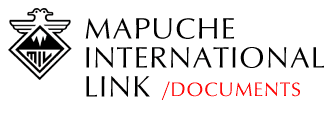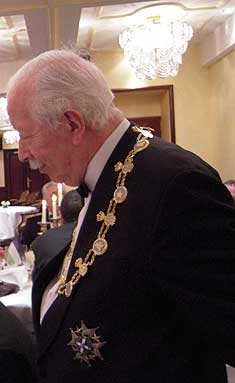
 |
|
|
| Home
| Front Page
| News
| Documents |
Environmental
| Archive
| Discussion
Point Links | About Us |
|
Solemn declaration of the Prince of Araucanía and Patagonia We, Philip, Prince of Araucanía and Patagonia, Futha Apo Toki (1), Head of the Royal Household, to all those present and to come;
Noting that the government’s decision flagrantley disregards the 2007 United Nations Declaration of the Rights of Indigenous Peoples, and the International Labour Organization 'convention 169', ratified by Chile in 2008. These actions taken by the Chilean Government constitute an alarming violation towards the rule of international law; Exercising the sovereign powers established in the National Constitution of 17th November 1860, and conforming to Ad-mapu (3) which supports the continuation of our traditions, laws and customs and having listened to the advice of our Councillors; Exercising the recognition of Mapuche people's independence by the Spanish Crown, in the Treaty of Killen of 1641 – an event which established the frontier and marked a new relationship under the principles of equality and mutual respect between both peoples; Reaffirming the inalienability of our territories guaranteed by more than thirty bilteral international treaties, the last celebrated in the General Parliament of Negrete of the 3rd, 4th and 5th of March, 1803; Supported by international law, which recognises the sovereign rights of the Mapuche people to possess, maintain and make use of their territories and resources as they so choose. We declare the following: That the application of mock constitutional recognition, nor any de facto laws that have been implemented by the Chilean governmnent have no validity in the Mapuche nation territorities We reaffirm the legitimacy of the ancestral social organization of the Mapuche people and the validity of our civil, political, diplomatic and traditional religious authorities. We declare the commercial activities of large companies in the Wallmapu (4), illegal, these are undertaken without the free and prior informed consent of Mapuche communities and their local authorities. We denounce as meaningless all those commemorative dates which promote ethnocentrist cultural uniformity, as this offends our dignity and national identity. We reaffirm the inviolability of areas of sacred, spiritual and recreational value, such as cemeteries, nguillatue (5), and paliwe (6). We claim as the property and heritage of the Mapuche nation all those areas including infrastructure projects implemented in Mapuche lands, such as water pipes, road construction, airports, fresh and salt-water areas that are currently privatised, forestry and hydro-electric installations. The Ñuke Mapu (7), our Motherland, is under attack, may we all rise to defend her! Freedom for all Mapuche hostages of the Chilean state! To our Pu peñi ka pu lamngen (8), our political prisoners. We call on all Mapuche to unite, to exercise our inherent right to self-determination guaranteed under international law. Kompuche (9) – an end to participation in fraudulent “consultations”. Exercise your rights. Marrichiweu! (10) [“We shall overcome”]
Paris, 8th April 2009 Mapuche language glossary
_____________________ Translated by: Alex Sharp
|
| |
||
|
||
